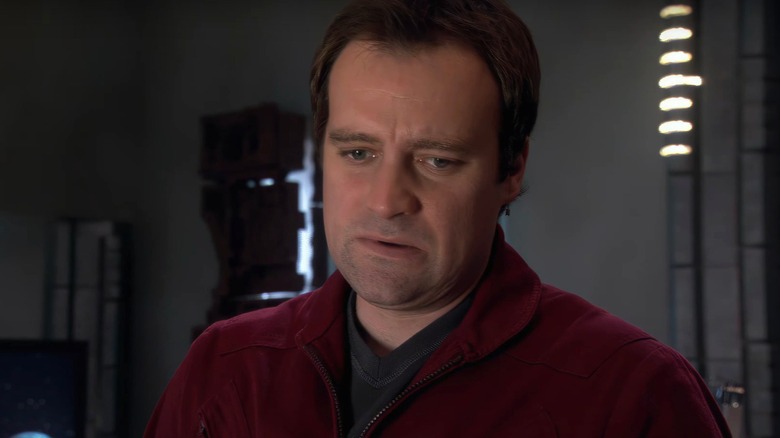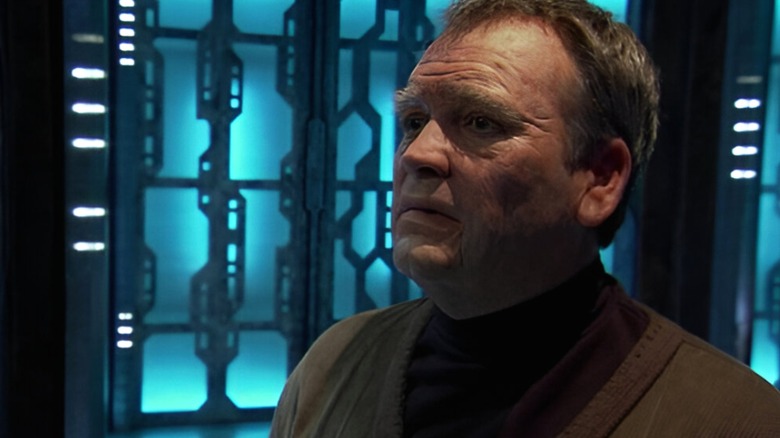The Poignant Stargate Atlantis Episode That Had David Hewlett Worried
This post contains spoilers for "Stargate Atlantis."
"Stargate Atlantis" is chock-full of fantastic episodes, thanks to the Syfy show's tendency to mix incredible character moments with compelling worldbuilding. Over the course of five seasons, "Atlantis" succeeds in becoming a worthwhile continuation of the "Stargate" franchise, expanding the scope of the sci-fi premise that oscillates between playfully campy and genuinely effective elements. The full might of the show's creative process, however, manifests in season finales, and the end of season 4 is no exception, as its 20th episode — titled "The Last Man" — is incredibly hard-hitting. The episode ends with a troubling cliffhanger, but the lead-up to it is both emotional and exciting, replete with time travel shenanigans that have always been an integral aspect of "Stargate" lore.
"The Last Man" opens with a concerning turn of events. Lt. Colonel John Sheppard (Joe Flanigan) docks at the strangely abandoned Atlantis gate (the show makes a spirited interpretation of the lost city myth), and is shocked by the presence of an odd hologram. The hologram belongs to crewmate Dr. Rodney McKay (the fantastic David Hewlett), who informs Sheppard that the Lt. Colonel has accidentally traveled 48,000 years into the future, and that things are not looking good in this timeline. This considerably aged version of McKay informs Sheppard that the latter was involved in a freak accident, which caused the ship to travel forward in time by 48,000 years, making him the last person alive in the entire universe.
This is a solid, intriguing premise, as it genuinely jeopardizes the fates of beloved characters along with that of the galaxy at large, creating massively high stakes throughout the episode. A risky plan is hatched in a matter of seconds, with McKay advising Sheppard to travel back to 2008, while emphasizing that the margin of error must be minuscule.
In this season finale, Hewlett got the opportunity to play a more aged-up version of his character, which came with its challenges, but according to the actor, was rather fun to embody. In an interview with Gateworld, Hewlett spoke at length about these added prosthetics and what this altered appearance meant for the emotional rollercoaster that is "The Last Man."
Hewlett was anxious (and excited) while shooting The Last Man due to a plethora of reasons
Hewlett had to put on prosthetics to embody an older McKay from the future, and the actor perceived this new look through a comical lens, as it was fun to play around with possibilities. He envisioned this aged-up version with less hair and even fewer teeth, wanting to embrace a sliver of humor amid the depressingly bleak circumstances that the episode mires in:
"The makeup was so beautiful that, honestly, I think there's a tendency [...] the danger there is to act too old, because you're so enthralled with what they've done to your face [...] I was going to remove my teeth every so often. I wanted to lose my hair. I told them, 'Come on! You've got to recede it back to nothing!' Because that's just the ultimate depression for McKay [...] Surprisingly, they didn't go for that. They went for poignancy."
Poignancy is the perfect word for how you feel when you see McKay's hologram, as his rapid aging prompts a sense of sad unease to linger throughout the episode. Sheppard is all alone in an ancient city with a long, complicated history, surrounded by nothing except the hologram of a dear friend who wants to save him by pulling him through space-time. There's a lot going on here, as McKay also paints a devastating picture of the future, mapping a long chain of cause and effect that seems to have doomed every living being in the universe. On a personal level, Hewlett was also anticipating the birth of his child while filming, which added to the cocktail of emotions he felt while playing the role.
It is also worth noting that "The Last Man" doesn't cut to grand action or theatrics to drive its bleakness home. It lingers on a long, heavy conversation, with McKay doing most of the talking. It is a medley of urgency and desperation, where a ton of flashbacks are used to infuse Sheppard's present with concerning immediacy. In Hewlett's own words, the experience turned out to be "a lot of fun" despite being challenging on a technical level:
"And it was like four hours of prosthetics. And talking, just this endless stuff to talk about. And I was kind of worried, because when I read the script, I was like, 'That's a lot of talk.' It's a lot of flashback stuff. But I saw the episode and I really, really liked it. There's poignancy to it that I really didn't expect there to be. It was a lot of fun. A lot of fun."
"The Last Man" doesn't have a happy ending, which only adds to the desolation of the episode. But with Season 5 of "Stargate Atlantis" resolving this crisis soon after, there's little reason to worry. Even so, it can be rewarding to bask in the frenetic uncertainty of an older McKay wanting his friend to be alright, piercing through space and time just to make him feel a little less alone.

